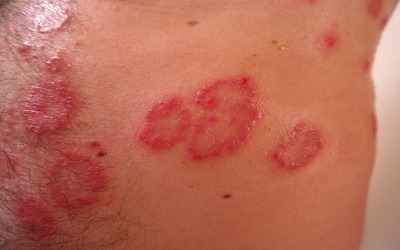Have you developed dry, silver, flaky skin? Do you get embarrassed in public when you see red, inflamed patches of skin?
[the_ad id=”6114″]
If you nodded along with a concern, then most probably you are suffering from psoriasis. Read on to get acquainted with the causes, symptoms, and treatments of psoriasis to understand the condition and get the necessary relief. Read on to learn about psoriasis.
What Is Psoriasis?
Psoriasis is a chronic autoimmune skin condition that triggers rapid buildup of your skin cells, thereby developing thick, silvery, red, or white spots of skin. Redness and inflammation around the spots is quite common. You suffer from psoriasis when your immune system misunderstands your normal skin cell as a pathogen and transmits faulty signals that lead to excess of production of new skin cells that grow deep in the skin and then rise to the surface gradually.
Is Psoriasis Contagious?
No, psoriasis is not contagious condition. Even though psoriasis is not contagious condition, it can create embarrassing condition for you.
5 Different Types Of Psoriasis:
There are five different types of psoriasis that you need to be aware of. These includes:
Plaque Psoriasis: Plaque psoriasis is the most common type of psoriasis, and about 80% affected individuals tend to suffer from this type. Inflamed, red patches on skin that are covered by whitish-silver plaques are common in plaque psoriasis. It affects knees, elbows, and scalp area.
Pustular Psoriasis: Pustular psoriasis affects adults causing pus-filled white blisters and red, inflamed broad skin areas. It usually affects small areas, such as feet or hands.
Guttate Psoriasis: This type of psoriasis usually occurs in childhood. Small pink spots are common symptoms of guttate psoriasis, and it affects the legs, arms, and torso of the body.
Inverse Psoriasis: Red, bright, inflamed skin areas indicates inverse psoriasis. Such patches develop under your armpits or breasts, around genitals’ skinfolds, or in the groin.
Erythrodermic Psoriasis: Erythrodermic psoriasis is a rare condition and it covers large, broad sections of your body. Your skin develops sunburnt appearance. Scales are observed in huge sections or sheets. The affected person may suffer from fever and illness.
Potential Causes Of Psoriasis:
Even though the cause of psoriasis remains unknown, researches reveal that certain factors leads to the development of this skin condition. Common causes of psoriasis are
- Immune System: Since psoriasis is an autoimmune disorder, white blood cells called T cells of your body mistakenly attacks your normal skin cells resulting in excess of production of skin cell. This causes piling up of skin cells on the surface of your skin resulting in plaques.
- Genetics: Genetics is one of the major causes of psoriasis, as some individuals inherit genes and develop psoriasis. You may find psoriasis developed among the members of the same family. However, the chances are quite less. Just 2% to 3% individuals with the gene tend to suffer from this skin condition.
- Smoking: Smoking may make you suffer from psoriasis, particularly women. If you already suffer from this skin disorder, then smoking may worsen your condition.
- Environmental Factors: Environmental factors, such as injuries to your skin, can cause or trigger psoriasis outbreaks.
8 Prominent Symptoms Of Psoriasis:
Symptoms of psoriasis differ from person to person depending on the type of psoriasis that affects you. Some common symptoms of psoriasis include.
• Red, flaky, irritated skin patches that mostly affect your knees, elbows, and middle parts of your body.
• Itchy skin
• Pink-red skin color
• Dry skin covered with flaky, silver scales of skin
• Soreness, burning sensation, or itchiness around the patches
• Thick-pitted, yellow-brown nails
• Swollen, painful joints
• Genital sores in males
You may experience psoriasis in cycles of symptoms. You may suffer from severe symptoms for some weeks or days and then the symptoms may vanish. After some weeks, the skin disorder may flare up again. At times, symptoms may vanish completely.
4 Effective Treatments For Psoriasis:
Even though there is no cure for psoriasis, certain treatments help in alleviating the inflammation, plaques, itchiness, and other skin hazards. Doctor may recommend a single treatment or combination of these treatments to mitigate the symptoms of psoriasis. Some effective treatments for psoriasis include:
Topical Treatments:
Applying ointments and creams to your affected skin topically can help minimize mild or moderate symptoms of psoriasis. Topical treatments for this skin condition include prescribed moisturizer, topical corticosteroids, salicylic acid, topical retinoids, vitamin D analogues, and anthralin.
Systemic Medications:
If topical treatments and other remedies won’t work for you, then you may need injected or oral medications. Consult a skin specialist as you need to have these medications for short periods to avoid side effects. Some of these prescribed medications include biologics, methotrexate, retinoids, and cyclosporine.
Ultraviolet Light Therapy:
Light therapy treatment uses natural light or ultraviolet light. Application of sunlight aids in killing overactive WBCs, which attack healthy skin cells that cause rapid growth of your skin cells. UVB and UVA aid in alleviating mild to moderate symptoms of psoriasis.
Home Remedies:
Last, but not the least, home remedies may help in minimizing your troubles to some extent. Make sure you have a shower or bath daily. Do not scrub your affected skin hard as it may trigger an attack. Maintain your skin moist and clean. Go for relaxation techniques to obtain relief.
Source:

